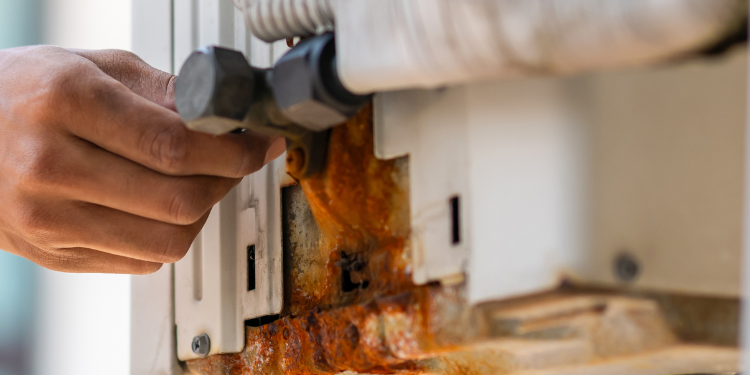If you’re living in Richardson, Allen, Frisco, Plano, or any of the surrounding areas, you know how crucial a properly functioning AC unit is, especially during the hot Texas summers. However, when your AC unit starts leaking water, it can quickly turn into a major concern, not just for your comfort but for your home’s safety. At Casto Leak Detection, we understand the stress a leaking AC unit can cause, and we’re here to help you figure out what might be wrong.
Whether you’re dealing with a small drip or a more significant water leak, it’s essential to address the issue quickly to avoid more significant problems down the line. Water damage can affect your walls, flooring, and even the structural integrity of your home. In this blog post, we’ll walk you through some of the most common causes of AC unit leaks, what you can do to prevent further damage, and when it’s time to call a professional leak detection service.
Key Takeaway: If your AC unit is leaking water, there could be several causes, from a clogged drain line to low refrigerant levels. Understanding these causes can help you prevent long-term damage to your home and keep your AC system running smoothly.
Clogged Condensate Drain Line
Build-Up of Dirt and Debris
One of the most common reasons for water leaking from your AC unit is a clogged condensate drain line. The drain line is responsible for carrying the moisture produced by your AC unit out of your home. Over time, dirt, dust, and debris can build up in the line, creating a blockage. When this happens, water has nowhere to go and starts leaking from your unit. Regular cleaning and maintenance can help prevent this issue from occurring. In the Richardson and North Dallas areas, the accumulation of pollen and dust during peak allergy seasons can exacerbate this problem.
Algae Growth
Another contributing factor to clogged drain lines is algae growth, especially in the humid Texas climate. Algae can form inside the condensate line, leading to a complete blockage. This is more likely to happen during the summer months when your AC is running constantly. If you notice water pooling around your unit or if it’s not cooling efficiently, algae may be the culprit. Using a professional service like Casto Leak Detection can ensure this issue is caught early.
How to Prevent It
The good news is that you can prevent a clogged condensate drain line with routine maintenance. Make sure to schedule regular inspections and cleanings to keep the line clear and reduce the chances of leaks. If you’re unsure how to do this yourself, reach out to a professional service that specializes in leak detection and plumbing solutions. Learn more about our services here.
Frozen Evaporator Coils
Poor Airflow
Another reason your AC unit could be leaking water is frozen evaporator coils. When airflow over the coils is restricted, the temperature can drop too low, causing ice to form on the coils. As the ice melts, it turns into water, which can then leak out of the unit. Poor airflow can be caused by dirty air filters or a blocked return air duct, both of which are common issues in homes in Frisco and Garland.
Low Refrigerant Levels
Low refrigerant levels can also cause your AC unit’s evaporator coils to freeze. Without enough refrigerant, the coils can’t absorb heat properly, causing condensation to freeze. When this frozen condensation melts, it can leak and cause water damage to your home. Low refrigerant is a more serious issue and usually requires the expertise of an AC technician to resolve.
Preventing Frozen Coils
Preventing frozen coils is all about maintaining good airflow and ensuring your AC system is properly charged with refrigerant. Regularly change your air filters, and don’t forget to schedule annual maintenance to check refrigerant levels. If you suspect low refrigerant, contact Casto Leak Detection for expert service.
Damaged Drain Pan
Cracks and Rust
The drain pan sits beneath the evaporator coils and collects water that drips off during normal AC operation. Over time, the pan can crack or rust, particularly in older units or in homes where AC systems run frequently, such as in the hot climates of Plano and Wylie. If the drain pan is damaged, water will start leaking out of your unit instead of being safely funneled out of your home.
Age of the Unit
Aging AC units are more susceptible to drain pan issues. If your unit is more than 10 years old, it’s worth inspecting the pan for signs of wear and tear. A damaged drain pan can often be replaced, but in some cases, it may signal that it’s time for a new AC unit. This is especially important in areas like Addison, where the high summer temperatures put a lot of strain on AC systems.
Fixing a Damaged Drain Pan
Fixing a damaged drain pan is usually a straightforward process, but it’s crucial to catch it early. If left unchecked, the water damage can spread to other parts of your AC unit or even your home’s structure. Let Casto Leak Detection assess and fix the issue for you.
Answering Common Questions
Why is my AC unit leaking water inside my house?
A leaking AC unit inside the home is often due to a clogged condensate drain line or frozen evaporator coils. Both issues prevent water from being properly drained, causing it to leak into your living space.
Can I fix a leaking AC unit myself?
While some minor issues, like a clogged drain line, can be resolved with a little DIY work, more serious problems like low refrigerant or a damaged drain pan require professional attention. It’s always safer to consult with a leak detection specialist, especially to avoid long-term damage.
How can I prevent water leaks from my AC unit?
Preventing AC leaks starts with regular maintenance. Change your air filters frequently, schedule annual checkups, and clean the condensate drain line. If you notice any signs of water leakage, address it promptly before it becomes a bigger issue.
The Impact of Ignoring a Leaking AC Unit
Failing to address a leaking AC unit can lead to severe water damage, including mold growth, damaged walls, and even foundation issues. Homeowners in North Dallas and Sachse should be especially vigilant, as the hot and humid conditions can accelerate water-related damage.
How Weather in Texas Affects Your AC Unit
The extreme heat in Texas can put a lot of strain on your AC unit, making it more prone to issues like refrigerant leaks and frozen coils. Regular maintenance becomes even more critical during the summer months.
Why You Should Call a Professional
Although it may be tempting to try and fix a leaking AC unit yourself, calling a professional leak detection service like Casto Leak Detection ensures the problem is correctly diagnosed and repaired. Contact us today for all your AC and leak detection needs in the Richardson area and beyond.
Resources for Further Reading:







